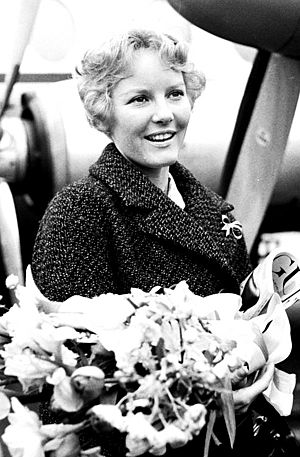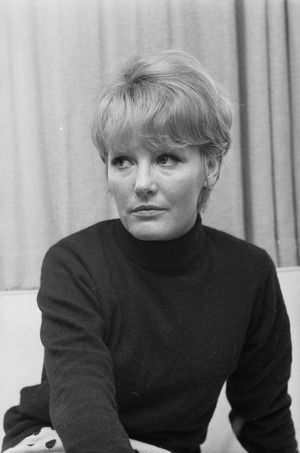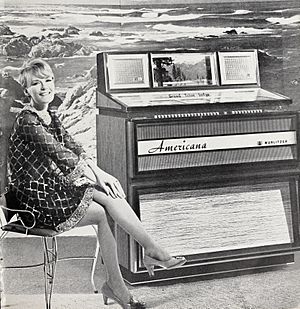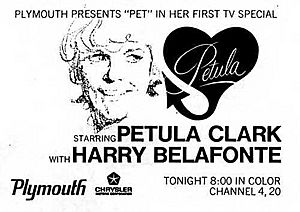Petula Clark facts for kids
Quick facts for kids
Petula Clark
|
|
|---|---|
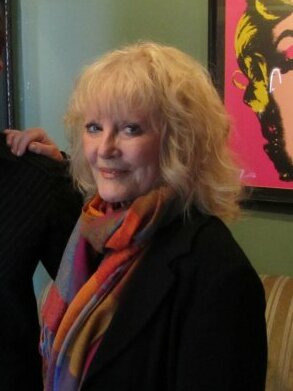
Clark in 2010
|
|
| Background information | |
| Birth name | Sally Clark |
| Born | 15 November 1932 Ewell, Surrey, England |
| Genres | Pop, schlager, theatre, film |
| Occupation(s) |
|
| Years active | 1939–present |
| Labels |
|
| Children | 3 |
Sally "Petula" Clark (born 15 November 1932) is a famous British singer, actress, and songwriter. She started her career as a child performer. She has had one of the longest careers of any British entertainer, lasting over 85 years!
Petula Clark began performing during Second World War on BBC Radio. In 1954, her song "The Little Shoemaker" became a big hit in the UK. Soon after, she started recording songs in French.
Her international hits include "Sailor" (which was number one in the UK), "Romeo", and "Chariot". She also had hit songs in German, Italian, and Spanish.
In 1964, Petula Clark became very popular in the United States. Many of her upbeat songs were written by Tony Hatch and Jackie Trent. Her most famous song, "Downtown", reached number one in the US. Other hits included "I Know a Place" and "My Love" (another US number one).
Between 1965 and 1968, she had nine songs in the US Top 20. She was even called "the First Lady of the British Invasion". Petula Clark has sold an amazing 70 to 100 million records worldwide. She also starred in the musical film Finian's Rainbow and stage musicals like The Sound of Music and Mary Poppins.
Biography
Petula Clark's Early Life
Petula Clark was born Sally Clark on 15 November 1932 in Ewell, England. Her parents, Doris and Leslie Noah Clark, were both nurses. Petula's father created her stage name, Petula. He said it was a mix of his two former girlfriends' names, Pet and Ulla.
She grew up in Abercanaid, Wales. Her first live performance was in 1939 at a local pub. During the Blitz, she lived near London and saw air battles. When she was eight, she recorded messages for the BBC to send to soldiers.
During one recording, an air-raid siren sounded. Other children were scared, so Petula volunteered to sing to calm them. The people in the control room loved her voice and recorded her song, "Mighty Like a Rose".
As a child, Petula sang in her chapel choir. She was also good at copying famous singers like Vera Lynn. In 1944, her father took her to see a play. After that, she decided she wanted to be an actress. Her first public performances, however, were as a singer. In 1945, she sang at a department store for a tin of toffee and a gold wristwatch.
Starting Her Career in Show Business
Petula Clark's career began by chance when she was seven. She appeared on radio, in films, and on TV. In October 1942, nine-year-old Petula made her radio debut. She was at a BBC broadcast with her father, trying to send a message to her uncle.
The broadcast was delayed by an air raid. The producer asked if anyone could perform to calm the audience. Petula sang "Mighty Lak' a Rose", and everyone loved it. This led to her performing in about 500 shows for soldiers.
Besides radio, Petula toured the UK with another child performer, Julie Andrews. Petula was called the "Singing Sweetheart". She performed for important people like George VI and Winston Churchill. She was also known as "Britain's Shirley Temple". Soldiers even put her photos on their tanks for good luck!
In 1944, film director Maurice Elvey discovered Petula at the Royal Albert Hall. He cast her in his war drama Medal for the General. She then appeared in many other films, including the Huggett Family series. She worked with actors like Anthony Newley and Alec Guinness.
In 1946, Petula started her TV career on a BBC show. This led to her hosting her own series, Petula Clark, and later Pet's Parlour. In 1947, she met Joe "Mr Piano" Henderson. They worked together on music and were a couple for ten years.
In 1949, Henderson introduced her to record producer Alan A. Freeman. Together with her father, they started Polygon Records. Petula recorded her first hits for this label. She had major UK hits in the 1950s, like "The Little Shoemaker" (1954). "The Little Shoemaker" was also a number one hit in Australia.
In 1955, Polygon Records was sold to Pye Records. This meant Petula signed with Pye, where she recorded until the early 1970s. She also helped new artists, like Joe Henderson, record their own music.
Becoming Famous in Europe
In 1957, Petula was invited to perform at the Paris Olympia. Even though she had a bad cold, the audience loved her. The next day, she was offered a contract with Vogue Records. There, she met Claude Wolff, who would become her publicist and husband. She was immediately drawn to him.
In 1960, she toured France and Belgium with Sacha Distel. She started recording songs in German, French, Italian, and Spanish. While focusing on her French career, she still had hits in the UK. Her 1961 song "Sailor" was her first UK number one.
"Romeo" and "My Friend the Sea" also reached the British Top-10. "Romeo" sold over a million copies worldwide. In France, "Ya Ya Twist" and "Chariot" (which became "I Will Follow Him") were huge hits in 1962. She also recorded songs by Serge Gainsbourg and was given a song by Jacques Brel.
In 1963, Petula wrote music for the French film A Couteaux Tirés. This added "film composer" to her talents. She also composed music for other films. Petula Clark was featured on the TV show This Is Your Life three times, which is very rare!
The "Downtown" Era and Global Stardom
By 1964, Petula's British music career was slowing down. Composer Tony Hatch visited her in Paris with new songs. Petula didn't like any of them. Then, he played a few notes of an unfinished song inspired by his trip to New York City. Petula loved the tune and said she wanted to record it if he could write good lyrics. That song became "Downtown".
Neither Petula nor Tony realized how big "Downtown" would become. Released in four languages in late 1964, it was a hit in many countries. A Warner Bros. executive heard it and brought it to the United States. "Downtown" became number one in the US in January 1965, selling 3 million copies there.
"Downtown" was the first of 15 Top-40 hits for her in the US. These included "I Know a Place" and "My Love" (her second US number one). She won Grammy Awards for "Downtown" in 1964 and "I Know a Place" in 1965. In 2004, "Downtown" was added to the Grammy Hall of Fame.
Her success led to many TV appearances on shows like The Ed Sullivan Show. In 1968, NBC asked Petula to host her own TV special. During a duet with guest Harry Belafonte, she held his arm. Some people were worried about this moment on TV. However, Petula and her husband, Claude Wolff, insisted it stay in the show.
The show aired on 8 April 1968, just after the assassination of Martin Luther King Jr.. It received high ratings and praise. This moment is remembered as a stand for equality on television. Petula hosted two more TV specials and a BBC series.
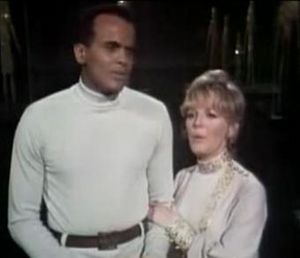
In the late 1960s, she starred in two big musical films. She was in Finian's Rainbow (1968) with Fred Astaire. She also starred with Peter O'Toole in Goodbye, Mr. Chips (1969). She toured the US, performing in famous clubs.
Petula also helped new musical talent. She introduced composer Michel Colombier to Herb Alpert. She also helped Karen Carpenter and Richard Carpenter get noticed. In 1969, she was one of the singers on John Lennon's song "Give Peace a Chance."
Petula Clark's Career from 1970 to 2000
In the early 1970s, Petula Clark continued to have hit songs like "Melody Man" and "The Wedding Song". She kept touring in the US and Europe. She also appeared in commercials for companies like Coca-Cola.
In the mid-1970s, she took a break to spend more time with her family. On New Year's Eve 1976, she sang "Downtown" on BBC1. She also hosted the TV series The Sound of Petula and appeared on The Muppet Show in 1977. Her last film role was in Never Never Land (1980).
Petula returned to the stage in 1981, playing Maria von Trapp in The Sound of Music in London. She received great reviews and was even called "the best Maria ever" by Maria Von Trapp herself. She was nominated for a Laurence Olivier Award. In 1983, she performed "For All We Know" as a tribute to her friend Karen Carpenter.
Her later stage work included Someone Like You, for which she wrote the music. She made her Broadway debut in Blood Brothers in 1993. From 1995 to 2000, she starred in Andrew Lloyd Webber's Sunset Boulevard. She has played the role of Norma Desmond more than any other actress.
In 1988, a new dance remix of "Downtown" called "Downtown '88" became a Top 10 hit in the UK. Petula continued to record new music. In 1998, Queen Elizabeth II made her a Commander of the Order of the British Empire (CBE). In 2012, she received a French award, the Commander of the Ordre des Arts et des Lettres.
Petula Clark's Career from 2000 to Present
Petula Clark toured the UK in 1998 and 2002. In 2000, she performed a one-woman show about her life in Montreal. A concert she gave in Paris in 2003 was released on DVD and CD. In 2004, she toured Australia and New Zealand.
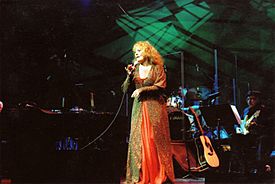
In 2006, a BBC Four documentary called Petula Clark: Blue Lady was made about her. She released a compilation album called Duets in 2007. She also hosted a PBS special about the 1960s British music invasion. Her song "Downtown" won an award for its use in the TV series Lost.
In 2008, her album Then & Now entered the UK Albums Chart. In 2010, she became president of the Hastings Musical Festival. Her album Une Baladine included new songs.
In 2011, a section of downtown Albany, New York, named its mascot "Petula Lark" after her. In November 2011, at age 78, Petula performed in Paris. She sang new songs, including one she wrote with her friend Charles Aznavour.
In December 2011, the band the Saw Doctors released their version of "Downtown" featuring Petula. It reached number two on the Irish chart. In 2013, she released a new album called Lost in You. It included new music and covers, like her version of "Crazy".
In October 2016, Petula released another English album, From Now On, and toured the UK. She appeared in a 2017 Christmas commercial for London Heathrow Airport, featuring her song "I Couldn't Live without Your Love".
In November 2017, she released Living for Today and went on her first US tour in five decades. In March 2019, it was announced she would return to the London stage in Mary Poppins as The Bird Woman. In 2023, she performed "I'm Still Here" at the Stephen Sondheim's Old Friends concert, which aired on the BBC.
Personal Life
In 1955, Petula Clark was in a relationship with Joe "Mr Piano" Henderson. People thought they might get married. But as Petula became more famous, Joe didn't want to be known only as "Mr Petula Clark." They ended their romantic relationship but remained friends.
In October 1957, Petula met Claude Wolff at Vogue Records in Paris. She was immediately attracted to him. When she learned he would work with her if she recorded in French, she agreed. They married in June 1961 and have two daughters and a son. They also have two adult grandchildren.
Petula has said she regrets not being closer to her children when they were younger because of her busy career. In 2013, she mentioned that she and Claude were no longer in a romantic relationship. Claude Wolff passed away on 20 March 2024.
Since the 1960s, Petula Clark has lived in Geneva, Switzerland. She also has a holiday home in the French Alps where she enjoys skiing. She also has a small home in London's Chelsea.
Filmography
- Medal for the General (1944)
- Strawberry Roan (1945)
- Murder in Reverse? (1945)
- I Know Where I'm Going! (1945)
- Trouble at Townsend (1946)
- London Town (1946)
- Vice Versa (1948)
- Easy Money (1948)
- Here Come the Huggetts (1948)
- Vote for Huggett (1949)
- The Huggetts Abroad (1949)
- Don't Ever Leave Me (1949)
- The Romantic Age (1949)
- Dance Hall (1950)
- White Corridors (1951)
- Madame Louise (1951)
- The Card (1952)
- Made in Heaven (1952)
- The Runaway Bus (1954)
- The Gay Dog (1954)
- The Happiness of Three Women (1954)
- Track the Man Down (1955)
- That Woman Opposite (1957)
- 6.5 Special (1958) (as herself)
- À Couteaux Tirés (1964) (also composed score)
- Finian's Rainbow (1968)
- Goodbye, Mr. Chips (1969)
- Drôles de zèbres (1977)
- Never Never Land (1980)
- Sans famille (1981, French mini-series)
Noteworthy Recordings
French Singles
- "Prends mon cœur" ("A Fool Such as I") (1960)
- "Garde-moi la dernière danse (Save the Last Dance for Me)" (1961)
- "Marin (Sailor)" (1961)
- "Roméo" (1961)
- "Ya Ya Twist" (1962, with Johnny Hallyday)
- "Chariot" (later "I Will Follow Him") (1962)
- "Les Beaux Jours" ("Ramblin' Rose") (1963)
- "Cœur blessé" ("Torture") (1963)
- "Je me sens bien auprès de toi (Dance On)" (1963)
- "Ceux qui ont un cœur (Anyone Who Had a Heart)" (1964)
- "Dans le temps (Downtown)" (1965)
- "Un jeune homme bien (A Well Respected Man)" (1965)
- "C'est ma chanson" ("This is My Song") (1967)
- "La Dernière Valse (The Last Waltz)" (1967)
- "Tout le monde veut aller au ciel" (1967)
German Singles
- "Monsieur" (1962)
- "Casanova Baciami" (1963)
- "Cheerio" (German version of "Chariot") (1963)
- "Mille Mille Grazie" (1963)
- "Warum muß man auseinandergeh'n (Mit weißen Perlen)" (1964)
- "Alles ist nun vorbei (Anyone Who Had a Heart)" (1964)
- "Downtown" (German version) (1965)
- "Kann ich dir vertrauen" (1966)
- "Verzeih' die dummen Tränen" (German version of "My Love") (1966)
- "Love – so heißt mein Song" (German version of "This is My Song") (1967)
- "Alle Leute wollen in den Himmel" (German version of "Tout le monde veut aller au ciel") (1967)
Italian Singles
- "Monsieur" (Italian lyrics) (1962)
- "Sul mio carro (Chariot)" (1962)
- "Quelli che hanno un cuore (Anyone who had a heart)" (1964)
- "Invece no" (1965)
- "Ciao, ciao (Downtown)" (1965)
- "Cara felicità (This is my song)" (1967)
- "Kiss Me Goodbye" (Italian version) (1968)
Complete Spanish Recordings
- "Qué tal, Dolly? (Hello, Dolly!)"
- "Pequeña Flor (Petite Fleur)"
- "Tú no tienes corazón (Anyone Who Had a Heart)"
- "Cantando al caminar (The Road)"
All four songs were released in 1964 in Spain on Hispavox EP "Petula Clark canta en Español".
Other Noteworthy Recordings
- "Put Your Shoes on Lucy" (1949)
- "House in the Sky" (1949)
- "I'll Always Love You" (1949)
- "Clancy Lowered the Boom" (1949)
- "You Go to My Head" (1950)
- "Music! Music! Music!" (1950)
- "You Are My True Love" (1950)
- "May Kway (Rose, Rose I Love You)" (1951)
- "Mariandl" (with Jimmy Young) (1951)
- "Where Did My Snowman Go?" (1952)
- "The Card" (1952)
- "Christopher Robin at Buckingham Palace" (1953)
- "Meet Me in Battersea Park" (1954)
- "Suddenly There's a Valley" (1955)
- "Another Door Opens" (1956)
- "With All My Heart" (1957)
- "Fibbin'" (1958)
- "Devotion" (1958)
- "Dear Daddy" (1959)
- "Mama's Talkin' Soft" (1959)
- "Cinderella Jones" (1960)
- "Marin" ("Sailor") (1961)
- "La Nuit N'en Finit Plus" ("Needles And Pins") (1963)
- "Ceux qui ont un cœur" ("Anyone Who Had a Heart") (1964)
- "Petite Fleur" (1964)
- "Invece no" (1965)
- "Dans le temps" ("Downtown") (1965)
- "Sauve-moi" (1977)
- "C'est si bon" (1978) (with Mireille Mathieu)
- "Fred and Marguerite" (1980)
- "The Bumble Bee" (1980)
- "Mr. Orwell" (1984)
- Blood Brothers (International Recording) (1995)
- Songs from Sunset Boulevard (1996)
- Here for You (1998)
- The Ultimate Collection (2002)
- Kaleidoscope (2003)
- "Starting All Over Again" (2003)
- Live at the Paris Olympia (2004)
- "Driven by Emotion" (2005)
- "Memphis" (2005)
- "Together" (2006), recorded as a duet with Andy Williams
- "Thank You for Christmas" (2006)
- "Simple Gifts" (2006)
- "It Had to Be You" (2007)
- Duets (2007)
- Solitude and Sunshine (2007)
- In Her Own Write (2007)
- Then & Now (2008)
- Open Your Heart: A Love Song Collection (2009)
- This is Christmas (2009)
See also
 In Spanish: Petula Clark para niños
In Spanish: Petula Clark para niños
- List of best-selling music artists
 | Jewel Prestage |
 | Ella Baker |
 | Fannie Lou Hamer |


